Handsome Austrian actor Egon von Jordan (1902-1978) appeared in 85 films between 1923 and 1974. The elegant gentleman was a star in German and Austrian silent films, but later he merely appeared in supporting and small roles, including as the Austrian prime minister in the very successful Sissi trilogy.

German postcard by Ross Verlag, no. 1944/1, 1927-1928. Photo: Rembrandt.
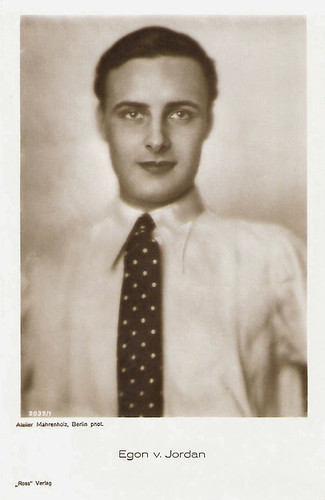
German postcard by Ross Verlag, no. 2035/1, 1927-1928. Photo: Atelier Mahrenholz, Berlin.
Egon von Jordan was born Egon Leopold Christian Jordan in Schloss Dux, Austria-Hungary (now Duchcov, Czech Republic) in 1902. He studied law at the University of Vienna for four semesters and took private acting lessons with Josef Danegger. In 1921 he made his debut at the Volkstheater in Wien (Vienna).
A year later he made his first film appearance in the silent film Das Gespenst auf Mortons Schloß/The Ghost on Mortons Castle (Hans Homma, 1922) with Grit Haid. A more prominent part followed in the Arthur Schnitzler adaptation Der junge Medardus/The Young Medardus (1923), directed by Michael Kertész, who later became famous in Hollywood as Michael Curtiz.
From 1925 to 1930, von Jordan was committed at the Deutsches Theater in Berlin, and in the 1930s he played in Vienna at the Theater an der Wien, and again at the Volkstheater. Meanwhile, he also starred in such silent films as Man spielt nicht mit der Liebe/Don't Play with Love (Georg Wilhelm Pabst, 1926) with Lily Damita, and Die glühende Gasse/The Glowing Alley (Paul Sugar, 1927) starring Hans Albers. The elegant von Jordan appeared in these films as the perfect gentleman.
After the introduction of the sound film, he went to Hollywood to star in three German language versions of MGM productions, Mordprozess Mary Dugan/The Mary Dugan Case (Arthur Robison, 1931) opposite Nora Gregor, Menschen hinter Gittern/Men behind bars (Pál Fejös, 1931) with Heinrich George, and Casanova wider willen/Parlor, Bedroom and Bath (Edward Brophy, 1931) with Françoise Rosay and Buster Keaton.
Back in Europe he appeared opposite such popular stars as Joseph Schmidt in Ein stern fällt vom himmel/A Star Fell from Heaven (Max Neufeld, 1934) and Paula Wessely in Die ganz grossen Torheiten/The quite big follies (Carl Froelich, 1937). During the war years he refused to cooperate with Nazi propaganda films and appeared in Austrian light entertainment films such as Meine Tochter lebt in Wien/My Daughter Lives in Vienna (E.W. Emo, 1940) with Hans Moser, Wiener Blut/Vienna Blood (Willi Forst, 1942) and Musik in Salzburg/Music in Salzburg (Herbert Maisch, 1944) starring Willy Birgel.
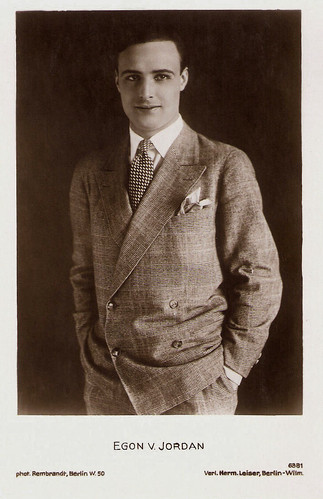
German postcard by Verl. Herm. Leiser, Berlin-Wilm., no. 6381. Photo: Rembrandt, Berlin.
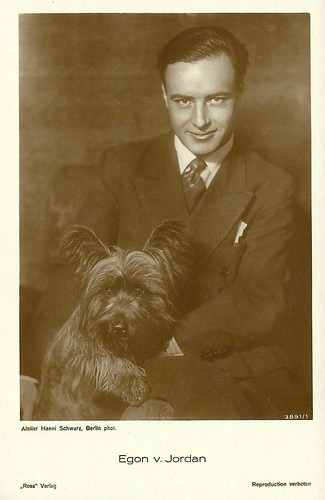
German postcard by Ross Verlag, no. 3891/1, 1928-1929. Photo: Atelier Hanni Schwarz, Berlin. Collection: Didier Hanson.
After the war, Egon von Jordan appeared at many stages in Germany and Austria. In Italy, he had a supporting part in the film Romanzo d'amore/All for Love (Duilio Coletti, 1950) with Danielle Darrieux and Rossano Brazzi. Back in Austria, he appeared in the crime film Abenteuer in Wien/Adventures in Vienna (Emil E. Reinert, 1952) with Gustav Fröhlich.
During the 1950s, he played councillors, barons and historical figures from the time of the Habsburg Empire in several Austrian films, including Eine Nacht in Venedig/A Night in Venice (Georg Wildhagen, 1953), Bel Ami (Louis Daquin, 1955) featuring Johannes Heesters, the operetta Gasparone (Karl Paryla, 1956) and Sebastian Kneipp (Wolfgang Liebeneiner, 1958) with Carl Wery. In Hab' ich nur Deine Liebe/Am I Just Your Love (Eduard von Borsody, 1953), he appeared as composer Jacques Offenbach.
A triumph were the Sissi films, Sissi (Ernst Marischka, 1955), Sissi - die junge Kaiserin/Sissi: The Young Empress (Ernst Marischka, 1956) and Sissi - Schicksalsjahre einer Kaiserin/Sissi: The Fateful Years of an Empress (Ernst Marischka, 1957), starring Romy Schneider. Von Jordan played the Prime Minister of Austria, Graf Arco in this popular trilogy. He and Schneider acted together again in the historical romance Katia/Adorable Sinner (Robert Siodmak, 1959), in which he played only a bit role.
In the 1960s and 1970s, he appeared in the military satire Der brave Soldat Schwejk/The Good Soldier Schweik (Axel von Ambesser, 1960) featuring Heinz Rühmann, Stadt ohne Mitleid/Town Without Pity (Gottfried Reinhardt, 1961) with Kirk Douglas, the Johannes Mario Simmel adaptation Und Jimmy ging zum Regenbogen/And Jimmy Went to the Rainbow's Foot (Alfred Vohrer, 1971) with Horst Tappert, and the monumental biography Karl May (Hans-Jürgen Syberberg, 1974), his final film.
In these years he could also be seen in several television films and series. His last appearance was in the TV film Verurteilt 1910/Sentenced in 1910 (Jörg A. Eggers, 1974) as Emperor Franz Joseph. Egon von Jordan passed away anonymously in Vienna in 1978. He was 76.

German postcard by Ross Verlag, Berlin. Photo: Atelier Oertel, Berlin.
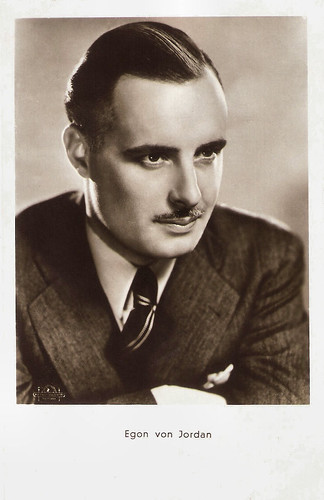
Austrian postcard by Iris-Verlag, no. 6042. Photo: Metro-Goldwyn-Mayer. In 1931, Egon von Jordan appeared in three alternative language versions of MGM productions, including the Buster Keaton comedy Casanova wider Willen (Edward Brophy, 1931), the German language version of Parlor, Bedroom and Bath (Edward Sedgwick, 1931).
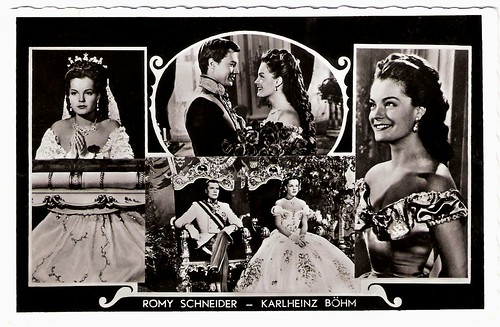
Dutch postcard by N.V. Int. Filmpers (I.F.P.), Amsterdam, no. 1027.
Sources: Philippe Pelletier (Ciné-Artistes - French), Thomas Staedeli (Cyranos), Wikipedia (English and German) and IMDb.
This post was last updated on 27 November 2024.

German postcard by Ross Verlag, no. 1944/1, 1927-1928. Photo: Rembrandt.

German postcard by Ross Verlag, no. 2035/1, 1927-1928. Photo: Atelier Mahrenholz, Berlin.
Perfect gentleman
Egon von Jordan was born Egon Leopold Christian Jordan in Schloss Dux, Austria-Hungary (now Duchcov, Czech Republic) in 1902. He studied law at the University of Vienna for four semesters and took private acting lessons with Josef Danegger. In 1921 he made his debut at the Volkstheater in Wien (Vienna).
A year later he made his first film appearance in the silent film Das Gespenst auf Mortons Schloß/The Ghost on Mortons Castle (Hans Homma, 1922) with Grit Haid. A more prominent part followed in the Arthur Schnitzler adaptation Der junge Medardus/The Young Medardus (1923), directed by Michael Kertész, who later became famous in Hollywood as Michael Curtiz.
From 1925 to 1930, von Jordan was committed at the Deutsches Theater in Berlin, and in the 1930s he played in Vienna at the Theater an der Wien, and again at the Volkstheater. Meanwhile, he also starred in such silent films as Man spielt nicht mit der Liebe/Don't Play with Love (Georg Wilhelm Pabst, 1926) with Lily Damita, and Die glühende Gasse/The Glowing Alley (Paul Sugar, 1927) starring Hans Albers. The elegant von Jordan appeared in these films as the perfect gentleman.
After the introduction of the sound film, he went to Hollywood to star in three German language versions of MGM productions, Mordprozess Mary Dugan/The Mary Dugan Case (Arthur Robison, 1931) opposite Nora Gregor, Menschen hinter Gittern/Men behind bars (Pál Fejös, 1931) with Heinrich George, and Casanova wider willen/Parlor, Bedroom and Bath (Edward Brophy, 1931) with Françoise Rosay and Buster Keaton.
Back in Europe he appeared opposite such popular stars as Joseph Schmidt in Ein stern fällt vom himmel/A Star Fell from Heaven (Max Neufeld, 1934) and Paula Wessely in Die ganz grossen Torheiten/The quite big follies (Carl Froelich, 1937). During the war years he refused to cooperate with Nazi propaganda films and appeared in Austrian light entertainment films such as Meine Tochter lebt in Wien/My Daughter Lives in Vienna (E.W. Emo, 1940) with Hans Moser, Wiener Blut/Vienna Blood (Willi Forst, 1942) and Musik in Salzburg/Music in Salzburg (Herbert Maisch, 1944) starring Willy Birgel.

German postcard by Verl. Herm. Leiser, Berlin-Wilm., no. 6381. Photo: Rembrandt, Berlin.

German postcard by Ross Verlag, no. 3891/1, 1928-1929. Photo: Atelier Hanni Schwarz, Berlin. Collection: Didier Hanson.
Councillors, barons and historical figures
After the war, Egon von Jordan appeared at many stages in Germany and Austria. In Italy, he had a supporting part in the film Romanzo d'amore/All for Love (Duilio Coletti, 1950) with Danielle Darrieux and Rossano Brazzi. Back in Austria, he appeared in the crime film Abenteuer in Wien/Adventures in Vienna (Emil E. Reinert, 1952) with Gustav Fröhlich.
During the 1950s, he played councillors, barons and historical figures from the time of the Habsburg Empire in several Austrian films, including Eine Nacht in Venedig/A Night in Venice (Georg Wildhagen, 1953), Bel Ami (Louis Daquin, 1955) featuring Johannes Heesters, the operetta Gasparone (Karl Paryla, 1956) and Sebastian Kneipp (Wolfgang Liebeneiner, 1958) with Carl Wery. In Hab' ich nur Deine Liebe/Am I Just Your Love (Eduard von Borsody, 1953), he appeared as composer Jacques Offenbach.
A triumph were the Sissi films, Sissi (Ernst Marischka, 1955), Sissi - die junge Kaiserin/Sissi: The Young Empress (Ernst Marischka, 1956) and Sissi - Schicksalsjahre einer Kaiserin/Sissi: The Fateful Years of an Empress (Ernst Marischka, 1957), starring Romy Schneider. Von Jordan played the Prime Minister of Austria, Graf Arco in this popular trilogy. He and Schneider acted together again in the historical romance Katia/Adorable Sinner (Robert Siodmak, 1959), in which he played only a bit role.
In the 1960s and 1970s, he appeared in the military satire Der brave Soldat Schwejk/The Good Soldier Schweik (Axel von Ambesser, 1960) featuring Heinz Rühmann, Stadt ohne Mitleid/Town Without Pity (Gottfried Reinhardt, 1961) with Kirk Douglas, the Johannes Mario Simmel adaptation Und Jimmy ging zum Regenbogen/And Jimmy Went to the Rainbow's Foot (Alfred Vohrer, 1971) with Horst Tappert, and the monumental biography Karl May (Hans-Jürgen Syberberg, 1974), his final film.
In these years he could also be seen in several television films and series. His last appearance was in the TV film Verurteilt 1910/Sentenced in 1910 (Jörg A. Eggers, 1974) as Emperor Franz Joseph. Egon von Jordan passed away anonymously in Vienna in 1978. He was 76.

German postcard by Ross Verlag, Berlin. Photo: Atelier Oertel, Berlin.

Austrian postcard by Iris-Verlag, no. 6042. Photo: Metro-Goldwyn-Mayer. In 1931, Egon von Jordan appeared in three alternative language versions of MGM productions, including the Buster Keaton comedy Casanova wider Willen (Edward Brophy, 1931), the German language version of Parlor, Bedroom and Bath (Edward Sedgwick, 1931).

Dutch postcard by N.V. Int. Filmpers (I.F.P.), Amsterdam, no. 1027.
Sources: Philippe Pelletier (Ciné-Artistes - French), Thomas Staedeli (Cyranos), Wikipedia (English and German) and IMDb.
This post was last updated on 27 November 2024.
No comments:
Post a Comment